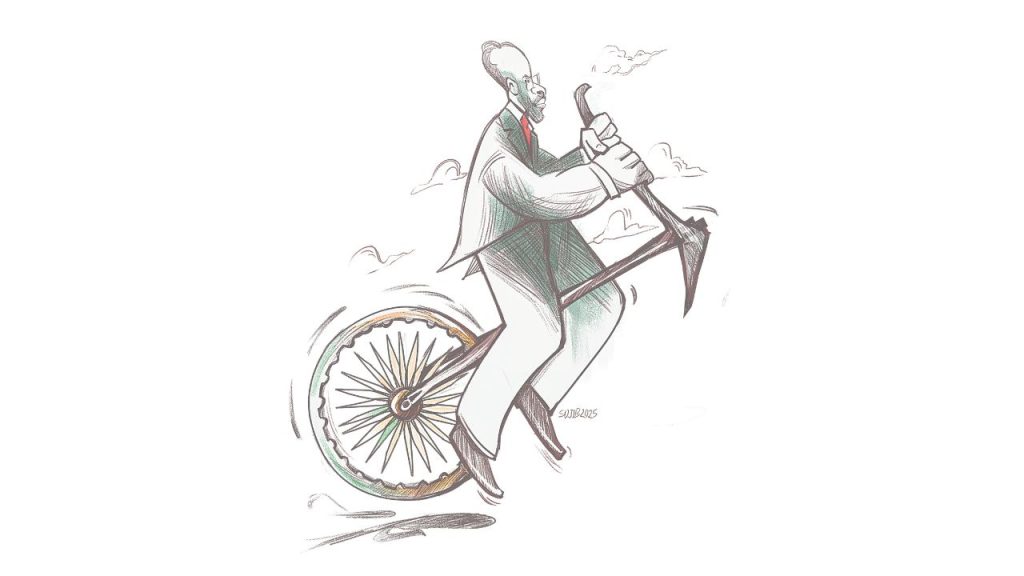The Jatiya Party (JaPa), long regarded as a fragile and subservient opposition force, has suddenly adopted a defiant tone, sparking questions over the true source of its strength.
Presidium member Haji Saifuddin Ahmed Milon made an unusually candid admission: “Our strength comes from foreign friends. We can’t deny it. But the real power of a political party is its people.”
Milon did not identify the “foreign friends,” but political analyst Professor Dilara Chowdhury pointed to India, recalling the role of Sujatha Singh, the country’s former foreign secretary, in forcing JaPa into the 2014 election.
“The root of JaPa’s power lies with people like Sujatha Singh. Statements of the party’s leaders over time prove this. Since the Awami League is now out of politics, our neighbours across the border want JaPa in the vote, not outside it,” she told TIMES of Bangladesh.
Her comments follow weeks of rising pressure on JaPa. On 29 August, Gono Odhikar Parishad chief Nurul Haque Nur was attacked outside his party office during a programme demanding JaPa’s ban.
Law enforcers were accused of involvement, and the government ordered a judicial probe. The incident prompted Jamaat-e-Islami, the National Citizen Party (NCP), and others to intensify calls for JaPa’s proscription.
BNP, however, took a different line—condemning the attacks but avoiding endorsing a ban. That stance, analysts say, has given JaPa breathing room. Within days, JaPa Secretary General Shamim Haider Patwary and other leaders began issuing strong statements, warning of “counterattacks” and even threatening to “lay siege to Dhaka.”
Professor Dilara argued that BNP is being deliberately tactical: “BNP may be trying to satisfy certain quarters while keeping electoral strategy in mind. JaPa leaders, however, have always shifted roles—sometimes in government, sometimes as a tamed opposition under Awami League.”
BNP leaders insist their position is pragmatic, not protective. “We want a trial of the autocratic Awami League and its collaborators,” said Joint Secretary General Shahid Uddin Chowdhury Annie. “But ahead of elections, BNP does not want any party creating instability. It is the government’s job to decide JaPa’s fate.”
Even so, BNP’s presence at a 5th September solidarity rally at Shahbagh—where 30 parties demanded JaPa’s ban—was followed the same evening by a fresh attack on the JaPa office. BNP then officially condemned the assault, reinforcing perceptions of a cautious balancing act.
Some political parties suspect BNP’s strategy is driven by electoral maths. If JaPa is excluded, the polls could lose legitimacy and give Jamaat and NCP greater leverage. Several Jamaat and NCP leaders told TIMES that BNP seems ready to rely on JaPa if others boycott, even positioning it as the opposition in a future parliament.
India’s shadow also looms large. JaPa’s founder, Hussein Muhammad Ershad, once admitted Sujatha Singh forced him into the 2014 polls. Ahead of the 2024 election, GM Quader himself said he could not disclose his discussions in Delhi without India’s approval.
Quader now denies foreign dependence. “JaPa is not new to this country. It has survived many ups and downs. Those who want us banned simply want us excluded from the vote. Political power comes from the people,” he said.
Yet with Milon conceding that “foreign friends” remain vital, JaPa’s sudden defiance has deepened suspicion that its resurgence is being shaped as much by outside players as by domestic politics.
Despite splintering into six factions since its founding in 1986, JaPa has remained the country’s third force, especially in northern districts. But its track record—joining government while claiming to lead the opposition—has left it accused of abetting the Awami League’s authoritarian drift.
Now, as the 2026 election nears, JaPa’s tough talk, BNP’s tactical stance, and India’s apparent influence are once again colliding at the heart of the country’s political stage.


